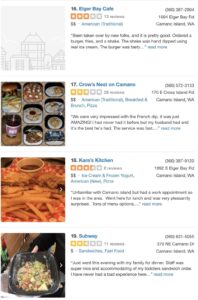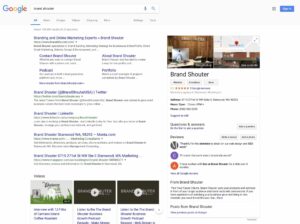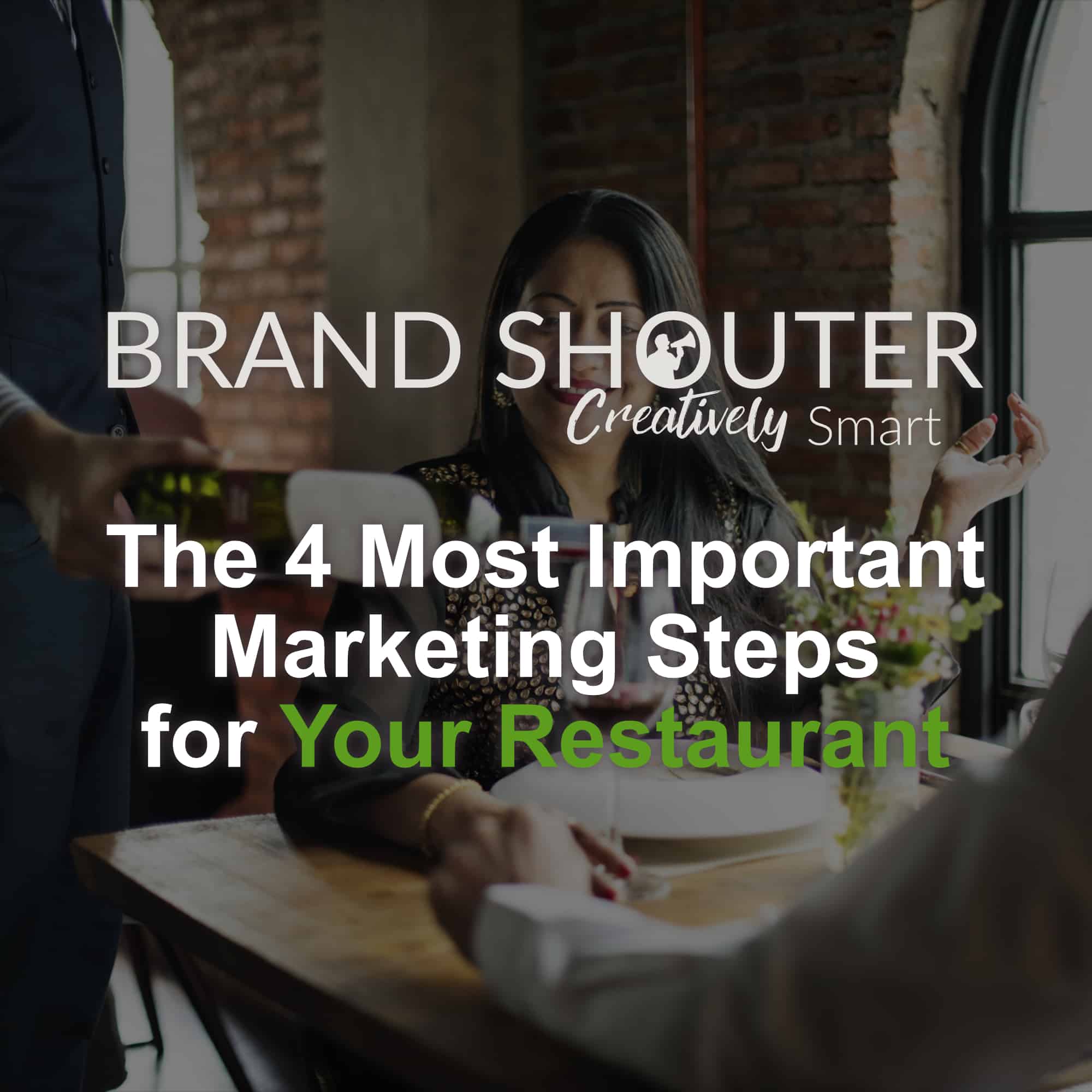Restaurant owners are quickly learning that they need to adapt to modern marketing techniques to protect their brand and serve their clientele. It's not enough to have your restaurant be a "hidden gem" or be on the latest episode of Diners, Drive-In's, and Dives. Instead, a restaurant owner needs to wade through the murky waters of sites like Yelp, Trip Advisor, Facebook, and even Google. One incorrectly fulfilled order, one disgruntled employee, or one extra picky customer is all it takes to start destroying a small restaurant's reputation and ultimately put it out of business. There are, however, many restaurants that have figured out the secret to succeeding in the modern era of openly opinionated, 280 character or less internet warriors. In this article, I'm hoping to impart some ideas and basic marketing techniques that can be used to help a new restaurant thrive - or help an existing restaurant pull itself out of the mire. These are the 4 most important steps for marketing restaurants.
Note to the reader: I've actually organized these in order of importance for completion. I think all of these are "musts" for any restaurant but if you're just starting on a plan for your restaurant's online marketing, this is the best order to follow.
1. In Marketing Restaurants, Reviews. Are. Everything.

So many restaurants go "full on ostrich" when it comes to online reviews. They know they have bad reviews but they just don't want to think about it. Honestly, bad reviews are difficult to overcome but not impossible.
If you look at the image close by, I took a screenshot of 4 local businesses (near me) that have less than desirable reviews. Subway is a national chain and still has only 2.5 out of 5 stars out of 11 reviews. I will admit, I've walked out of this location personally - the service was incredibly poor twice and I gave up after waiting in line for 10 minutes as the second person on the second visit.
The other places though... they don't look any better. Kara's kitchen is the newer incarnation of the old Elger Bay Cafe and while they squeezed out half a star more on less than half the reviews, that's still not going to change many minds. Contrast that to some of the other places in the area, visitors that rely on online reviews to point them to great local eating establishments won't be wasting their time.
Now, it's not futile. There is work to be done but these places could all turn around their fortune with a bit of work and a strategy. I've talked at length in a separate article I wrote about a tool that Wapiti has to help customers of your restaurant leave positive reviews while still addressing negative reviews, privately. I stand by that tool as it's the best I've seen for the price.
2. Your Website Must Be Designed For Mobile
Below is a common scenario that happens over and over each day with restaurants across the country:
Jenny and Earl finally got away from their kids (found a babysitter) for an evening on the town. They planned a night around a Broadway show that has traveled to a neighboring city and bought tickets immediately. They don't know the area very well but figured that a dinner venue would work itself out. As they near their destination, Jenny pulls out her phone and does a quick search for a place to eat. Thanks to the hard work you put in for your reviews (step 1, above), you look like a great choice and Jenny decides to navigate to your website to learn more about your menu and hours.
"These guys must be out of business or maybe they bought good reviews. Either way, they don't look like a place I want to go," she thinks. The website barely loads and is barely functional. She has to move the whole site around on her screen to see everything as it doesn't change to the size of her mobile device. In frustration, Jenny goes back to Yelp and finds another highly rated business and heads to their site. Their website loads and functions beautifully on her phone. Jenny and Earl go there to enjoy their meal before the show.
In this age of web design, mobile responsive sites are a default. If you hire a company to make a website for you and it doesn't adjust to look great on a mobile screen, you should fire them and ask for your money back - seriously. Another issue is that a lot of restaurants, especially single location restaurants that have been around for a while, have websites built quite a few years ago when mobile devices were new - or non-existent. Even worse, there are many restaurants that don't even have a website at all.
If you have a restaurant and you fit one of the scenarios that I just mentioned - it's imperative that you fix your site immediately. Most restaurants see over 80% of their website traffic coming from mobile devices. That means you have less to worry about if your site looks like junk on a computer as long as it looks good and functions well on a phone. Of course you want your site to look awesome on any display but it's important to place the lion's share of the emphasis on mobile.
3. Make Sure Your Online Citations Are Accurate

Your business listings online are ultra important. We've found that many of our clients don't even know they exist - and the ones that do, will often outright ignore that there is an issue to be taken care of. For this point, I wanted to add a small bullet list of reasons why it's important to keep your citations online accurate and up to date (in no particular order):
- Bad Addresses & Hours Mean Lost Business - This seems pretty obvious right? If people show up to eat and you're closed, they leave with a negative experience of your business. If people navigate to your restaurant and end up in the wrong location, you've ensured they will, more than likely, not eat at your establishment.
- Google & Other Search Engines Love Accurate Information (and rewards you for it) - When information on the web shows a synergy, search engines get super happy - in a manner of speaking. Their algorithms love to see matching information across multiple sites that build value for a searcher. This is different than duplicate content (which search engines hate), this is small pieces of important information that build the value of your brand.
- Helps Your Site Rank Better Overall - This is a bit of a byproduct of the bullet point above but, with all the accurate information synergy happening across the web, your site will gain ranking and start to own the space for brand specific searches. If you search for "brand shouter" in Google, you'll see that we own the first 5 pages of information about our business and services with the exception of a couple places that have found their way in. This only helps people find you and trust your business.
- Look Bigger Than You May Actually Be - For a restaurant specifically, this can be a big deal. This is often the first experience a potential customer will have with your restaurant. You can keep your mom & pop appeal if you desire but keeping your citations accurate online can give the impression that you "know what you are doing." Any web searcher that finds your restaurant will subconsciously rate your restaurant highly because you spent the time to focus on the details online.
4. Spend Money On Advertising
This is the last point I'll make in this article. I want to remind the reader that each point in this article are listed in a "fix first" order, not necessarily the order of impact it will have on your business. Advertising is often the single greatest way a restaurant can grow; however, without the foundation being set properly, you'll throw your money away.
I know advertising can be a large commitment. I also know that you (the business owner), your son/daughter, your friend, or some small marketing agency has already tried online advertising (Google, Bing, Twitter, Facebook, etc.) and your money disappeared with little to no return. This is the normal, everyday response I hear from restaurant owners (and business owners in general) whenever I chat about advertising. None of that past experience changes the fact that advertising your restaurant can make a huge difference in traffic, income, and ultimately the success of your restaurant.
Here are a couple tidbits to take with you as you contemplate getting a real marketing company to handle your advertising budget:
- You won't make money in the first 3 months.
- If your budget is small, you will often pay the marketing company an amount close to that budget just to manage it. For example, Wapiti's minimum stand-alone Ad management fee is $500. That means, if your total advertising budget is $800 a month, you would only have $300 left for advertising costs. There are instances where this make sense - and some where it doesn't.
- In contrast to the point above, a larger budget comes with much smaller management fees per dollar spent. We've managed $10,000/mo. spends for $1000/mo. in management fees before.(The actual fee for your restaurant depends on your business and the amount of tweaking.)
- Ultimately, you should discuss a realistic target Cost Per Acquisition with your marketing company and ignore the division of fees if your target CPA is reached.
In conclusion, most small restaurants are horrible at these four steps. If you're doing these things well - congrats! There are other things to work on but you have your foundational elements running. If you can see room for improvement in these steps, contact Wapiti for a quote and reference this article in your notes. We'd love to work with you towards your success!







